Advertisement
Malaysia appoints first female counterterrorism chief, Normah Ishak
- Normah Ishak takes over from Ayob Khan in a major milestone for the country’s police intelligence arm
- Among her first jobs will be what to do about the 65 Isis militants due to return to Malaysia from Syria
3-MIN READ3-MIN

Malaysia has appointed its first female counterterrorism chief in a major milestone for the country’s police intelligence arm, which has won international praise for its work in foiling plots by Islamic State (Isis).
Normah Ishak on Friday took over from Ayob Khan Mydin Pitchay as the principal assistant director of Special Branch’s Counter Terrorism Division.
Among the first jobs in her in-tray is likely to be the challenge of dealing with the pending return of 65 Isis militants and their families to Malaysia from Syria, some of whom are hardened jihadists.
Advertisement
Malaysia’s Inspector-General of Police Abdul Hamid Bador, who confirmed the appointment to the Post, described Normah as “gutsy, brainy, highly qualified and an experienced officer of very high integrity and an excellent commander”.
Normah, who joined the Royal Malaysian Police in December 1991, had been Ayob Khan’s deputy since 2016, a particularly busy time for the counterterrorism division when Isis was at the height of its power.
Advertisement
Advertisement
Select Voice
Select Speed
1.00x